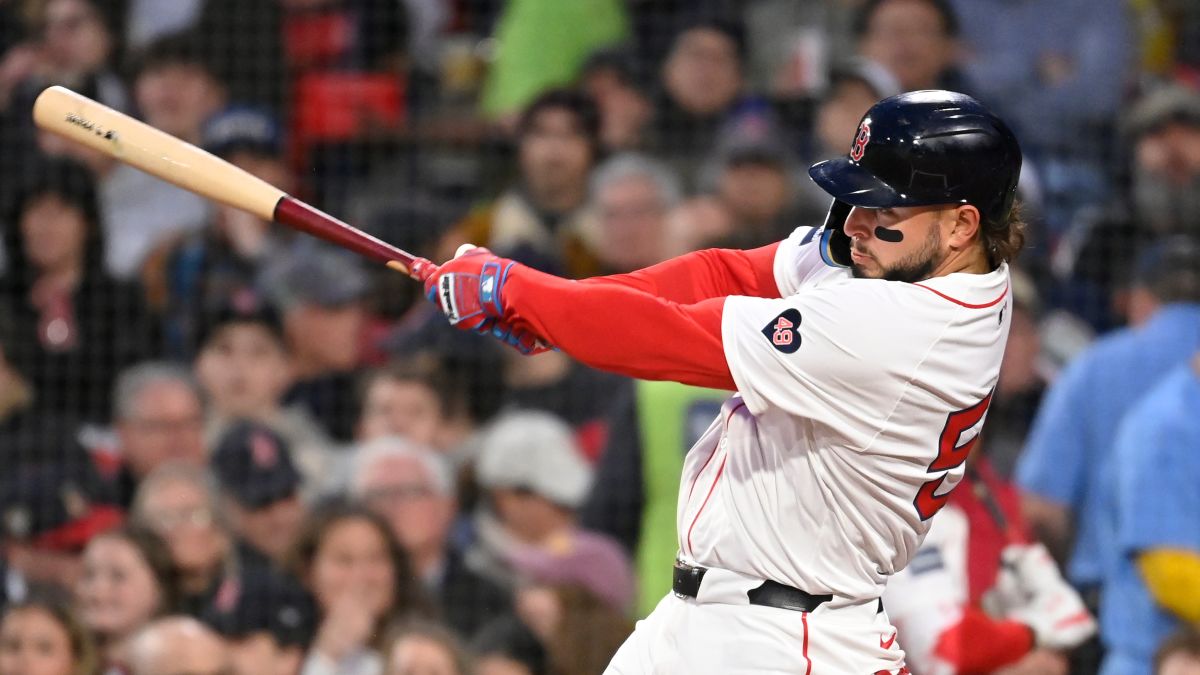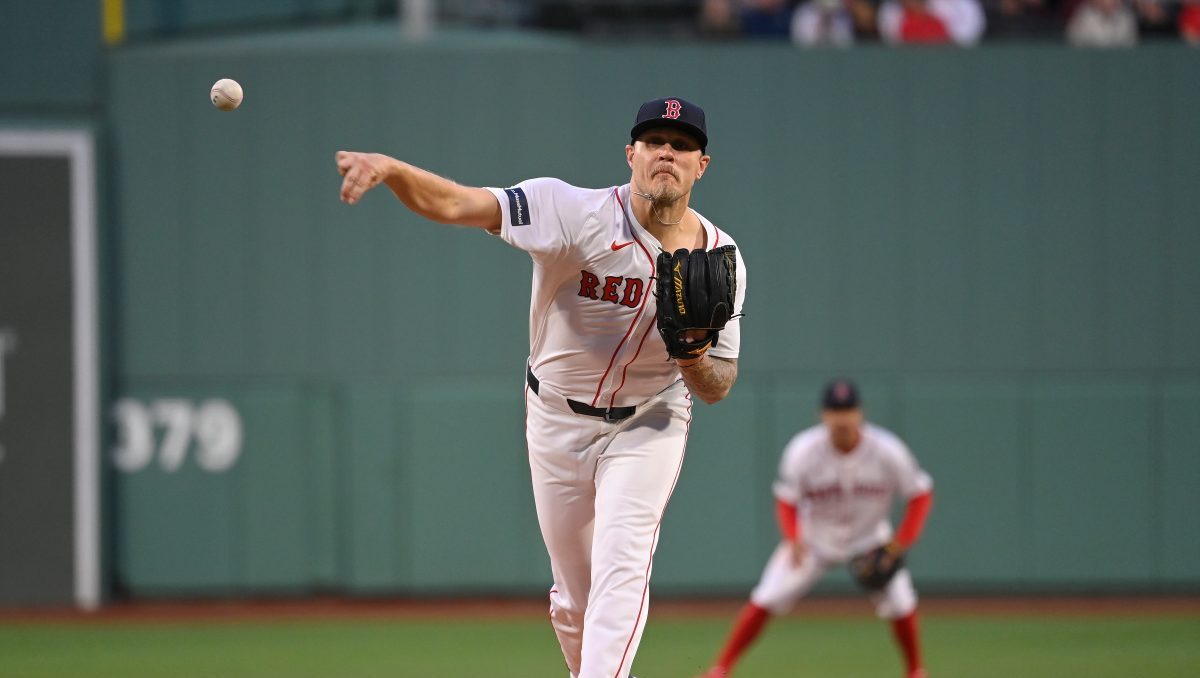
CARLSBAD, Calif. -- Sign stealing via electronic means will be among the first topics to be addressed today in the breakout sessions at the general managers’ meetings. Less than a week-and-a-half after the Red Sox won the World Series a couple hours north from here at Dodger Stadium, Major League Baseball is going to address an issue it has let fester.
MLB and its clubs have a daunting task ahead of them, one they did not proactively combat or at least not to a great enough extent -- although league officials disagree with that characterization. Paranoia and sometimes warranted worry have taken hold for players and organizations about impermissible sign stealing, in part because MLB lacks significant safeguards.
Baseball needs to adapt its rules to modern times. That may be through potential deregulation, allowing teams to do whatever they want with video feeds and signs they pick up during a game, or through greater restriction, a la NFL-style communications and earpieces.
One high-ranking club official in the National League said that last offseason, MLB started asking some clubs about potentially allowing pitchers and catchers to communicate with an earpiece, or the like. As an American League front office member noted: Why hasn’t that technology already been tested in the Arizona Fall League, or some other venue?
Now the matter is at least at the top of the docket. The next steps, however, are unclear.
“I have no idea,” said one high-ranking league official involved with the matter, who does not have permission to speak publicly. “Hopefully the GMs, we’ll get them in a room, we’ll have an idea.
"There’s two ways to go: Cut back on what clubs are allowed to do, you know in terms of cameras in the park, although that presents an enforcement issue.
Boston Red Sox
“Or go the other way, allow it.”
* * * * *
MLB's general sentiment is this: We've been presented a ton of whispers and a clear sense of a problem, but not concrete evidence enough to hammer any individual clubs.
Even though ignorance is easy to plead, it's actually believable. In baseball’s culture, cheating is to be kept quiet, lest you become an outcast for ratting on your team -- and there are likely plenty of other forms of technical cheating that go on undetected by the public.
Nonetheless, it should have been clear that teams would find clever ways to gain a leg up via technology as they invest in research and development. More than a year ago, baseball hinted at the climb it faced in policing sign stealing.
On Sept. 15, 2017, Commissioner Rob Manfred issued a statement addressing punishments issued to the Red Sox, who were found to be using wearable technology in their dugout.
“The prevalence of technology, especially the technology used in the replay process, has made it increasingly difficult to monitor appropriate and inappropriate uses of electronic equipment,” the statement read.
Baseball showed a tough stance then, too. The statement continued: "all 30 Clubs have been notified that future violations of this type will be subject to more serious sanctions, including the possible loss of draft picks."
But MLB has done little else to show actual strength in this arena, besides issuing memos to teams about the seriousness of these offenses. The league absolved the Astros of wrongdoing this postseason, when they had an employee going around to other dugouts to "monitor the field." That effort was described as counter-surveillance.
Maybe so. But the league did not pull out any stops to investigate any other claims, simply quelling the matter that was right in front of them.
* * * * *
The allegations heard around the game feel universal. Banging on garbage cans in the tunnel. Someone standing up in center field to indicate a fastball when a slugger is at the plate. Security guards assisting players. Scoreboard operators getting in on the act. But investigations have not followed, in part because of the difficulty of proving such incidents after the fact and, likely, because of how arduous the task would be of investigating such complaints without hard evidence behind them.
Baseball didn’t play catch up quickly enough, and now everyone is suspicious of everyone.
Stealing signs on the field with one’s eyes is legal. Many organizations have a center-field camera feed for the purposes of studying signs later. That use of a camera has been permissible, and remains permissible so long as the footage and its findings are not used during the game. (Notably, those cameras were not allowed to be used during the 2018 postseason.)
But studying signs via a camera in realtime, during a game, is a violation. It’s a fine line that may be arbitrary, but nonetheless exists.
MLB feels it took appropriate measures in this year’s postseason, when resident security agents monitored video rooms and beyond. It also believes it is aware of all cameras installed in stadiums.
Some people with 2018 playoff clubs suggested these measures amounted to merely visuals, rather than strong deterrents.
“The problem with that approach is that considering how big stadiums are and the multitude of ways that teams could try to cheat, they have a resource, or during the playoffs, maybe more than one resource, that are not formally trained into looking into these issues,” the American League front-office member said. “I think that you would find complaints from across the league that these people are altogether . . . incompetent in performing the duties.”
MLB, which did not want to see a distraction from the postseason and World Series over an integrity issue, disagreed.
Either way, what now?
* * * * *
Baseball needs to decide if it wants to both retroactively investigate what was allowed to happen in recent years — as technology and the search for competitive advantages helped bring the the game to this point -- or if it wants to only look forward.
Opening Pandora’s Box is an appropriate cliche.
What’s to stop a player from putting a wearable device in his wrist guard, or in his sliding shorts or back pocket? When he steps to the plate, someone else can alert him with a small vibration what’s coming. What’s preventing a video feed from a camera from going three buildings away to a secret office, and then someone alerting that wearable device? A security agent in a designated video room would not be the wiser.
There are as many as 20 to 40 "scouting cameras" in each park, and the technology has repercussions on player mindsets beyond signs.
A pitcher may study every little movement of his own to be sure he's not tipping, an Orwellian fear taking grip (of their grips). Bullpen coaches open binders of scouting reports only a crack, to avoid a camera picking up proprietary attack plans and information.
Punishing one team or three probably doesn’t affect that mindset, which may just be the new norm.
Starting in the 2018 regular season, MLB monitored video rooms with security agents who would roam between those rooms on both sides. Dugout phones were also recorded. But video rooms are not the only place a feed can be routed.
Teams have forever sought edges, and they won’t stop doing so. With no moral absolution for clubs that violate the rules, MLB has to legislate to curb behavior in a sport where everyone seeks tiny gains, and regard for the rules varies.
Cheating in general, its boundaries, and the silence it involves are all tied into baseball’s complex culture. The sport has never been clean and never will be. There’s always pine tar on someone’s glove, or maybe a therapeutic use exemption for a drug that just didn’t need to be given out.
The easiest example in today’s game: The shiny substance on a pitcher’s arm, or their cap or their belt, is not sweat and everyone knows it. Some rules, like those about foreign substances, are outwardly meant to be broken. During the World Series, Dodgers pitcher Ryan Madson talked publicly about using substances to get a better a grip in the cold.
Baseball is a sport that condones cheating, only until it does not. Arbitrary lines are everywhere.
* * * * *
Sign stealing isn’t universally regarded as helpful.
For example: a player who is told what pitch is coming may feel more obligated to swing at that pitch. And the system isn’t foolproof. If the batter is told a pitch is headed for one location and it ends up being another, the batter can be frustrated.
That’s not to minimize the potential advantage to knowing what’s coming.
Reliever Josh Fields, traded from the Astros to the Dodgers in 2016, said he had no direct knowledge of any illegal sign stealing, but explained his outlook.
“If they know I’m throwing a fastball, they know they have to be ready for a specific timing of that pitch,” Fields said. “Now, I can throw a pitch that’s right at the top of the zone that’s hard to hit. Sometimes, when they know what’s coming, it’s hard to not swing at it, because they’re anticipating, if it’s there they want to be. There’s still some leeway where I can throw it to perhaps where they’re not looking for it.
“I don’t want them to have it. I want them to be guessing between curveball, changeup or fastball. It’s not foolproof still. But it definitely is a huge advantage if you have plate discipline and a lot of these guys now, they’re better and better at that. I’d for sure be for something, especially from the electronic side of it.
“Now, you’re doing it longhand, that’s a different story.”
In a way, sign stealing is another microcosm of the old school and the new, and how the game changes with time.
The technology exists to see everything inside a ball park. Why ignore it?
“If you’re putting the time and effort in to saying, ‘Hey, this pitcher’s doing this on this certain pitch,’ that’s what guys have been doing for decades in the game,” Fields said. “That’s a different story. But I think pitch-by-pitch electronics, and then relaying that, say, with Apple watches, or relaying that with however they choose to do it, I don’t think that’s part of it.”
Not yet, anyway.
* * * * *
The rules do not adequately address the modern state of the field. They may never. Baseball is behind, but it can start to catch up more in earnest now, starting at the GM meetings.
“If you’re going to cheat, it’s hard -- it’s just like drugs,” the high-ranking league official said. “You’re never going to catch somebody right away. And sometimes it takes a long time to catch somebody, if you put a lot of resources in to it.
“We put some resources into it this season, more than we ever did before. But we didn’t spend millions of dollars in terms of locking down the stadium, and we’re going to have that discussion.”
Click here to download the new MyTeams App by NBC Sports! Receive comprehensive coverage of your teams and stream the Celtics easily on your device.


